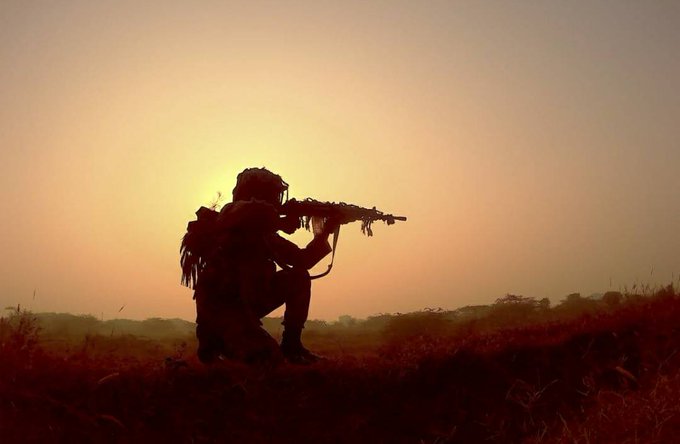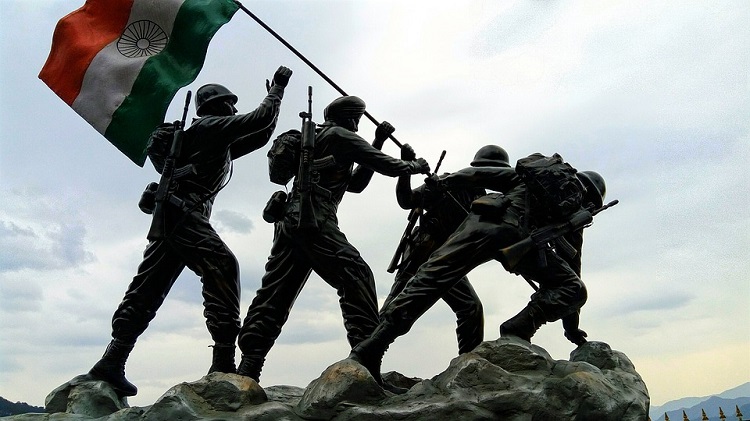‘Army is a unique, enriching, self-sustaining World,
Where you live life to the Fullest’
The Indian Armed Forces is a very widely respected and noble profession, where we live a life of dignity and adventure. While most join to make a living, they very soon realise that the profession of arms is actually a ‘Way of Life’ which embraces and envelops you, and members become a part of a well-knit fraternity for life. The quote ‘once a fauji, always a fauji’ is very apt indeed. In the course of my 43 years in the Indian Army (including training years in NDA and IMA), there are many leaders/jawans/ incidents/milestones which have come my way to enrich and motivate me, and left an indelible mark. I have penned down some thoughts and ‘feel good’ anecdotes, most of which are unique to the Indian Army.
The Cadet who never gave up
Coming from a civilian background, one faced a very tough time adjusting to the physical rigours of NDA life, unlike the popular saying ‘the tough get going, when the going gets tough’. My odd letter home would probably have conveyed a sense of despair. One fine day when I eagerly opened a postal parcel from home, hoping for some much-needed goodies, I found an article titled ‘The Cadet who never gave up’ thoughtfully sent by my Dad. The contents of the article which enumerated the challenges, hostility and prejudices faced by the first black US Army General motivated me to face all difficulties head-on and never look back.
Ticketless Travel
The first good Samaritan incident after commissioning was when I boarded the train to join my artillery regiment. Within a few minutes into the rail journey in a second AC coach which I was savouring for the first time, I found out to my horror, that I had forgotten my ticket. The TT while acknowledging the veracity of my confirmed reservation and identity, demanded that I disembark as one had to be in physical possession of a ticket, or pay for it with a hefty penalty, which I did not possess. Hearing the rather heated argument from a very agitated and worried YO (young officer), who was trying to convince a stubborn TT that travel he must, to report to his first army assignment and unit, a rather stern looking gentleman with an impressive commanding personality, ticked off the TT for daring to be rude to an Army Officer, paid the charges including the penalty on my behalf and quietly went and sat on his berth and continued reading his book. During the entire 40-hour rail journey the gentleman who was a serving Major (name and rank was the only information he was willing to part with), refused to give his address and left with the parting shot ‘in your journey in the Army, help another fauji in need’!
The Army Family
I vividly remember as a YO (young officer) on his first short leave, being booked by a ‘Police and Magistrate Check Post’ for driving down the wrong side of a street in Delhi on a borrowed scooter. Once again, I did not have the requisite money to pay the instant challan and faced the consequences of the borrowed scooter being confiscated and towed away to the nearest police station. My request to the magistrate explaining my lack of orientation after months in a remote field posting, on my first drive in Delhi fell on deaf ears, but caught the attention of an elderly civilian passing by. He immediately bailed me out by paying the challan, with an explanation to the magistrate and yours truly, that he is an ex short service commissioned officer and can never forget the wonderful days spent in the army. Anything for another fauji was his attitude. Fortunately, one enjoyed numerous such ‘help fauji’ episodes, like a passing by mechanic at midnight who helped repair my vehicle but refused to take any money, saying that he is acting as a citizen now and that too rendering assistance to an army man.
Lessons from my First Boss: My first battery commander taught me some basic ethos of army life–
- Train hard and always support your subordinates. Push and train subordinates hard and relentlessly, appear hard as nails but when the subordinate/YO (young officer)/jawan is in trouble or needs help, be patient, show empathy and always support the men under command especially junior leaders (NCOs, JCOs and YOs), in front of colleagues and superiors like the CO (commanding officer). While in my opinion he harassed me no end, in front of the CO, he always praised me for my sincerity and dedication, and I could do no wrong. An inspiring lesson at the start of your career.
- Empathy and Compassion.Even when the unit is engaged in a very important commitment, send your subordinate with an emergency/ compassionate need on leave immediately even if you suspect the veracity of his circumstances. Nobody is indispensable, and one can always verify concurrently, but you can never forgive yourself, if the compassion was genuine and you stopped your subordinate from an essential domestic commitment.
- ‘Old School Ethos’. I joined a divisional HQ in an operations branch appointment within a 48 hours’ notice period, due to the tragic circumstance of the divisional commander and my predecessor having expired in a helicopter crash. I still remember my first meeting with my boss the Col General Staff, whose directions to me prior to taking over my assignment especially confidential documents was “if any confidential or sensitive documents and maps are missing, report to me, and remember we will never blame dead men”. His directions were so inspiring, in keeping with the glorious traditions of soldiering, that after that initial incident, he became my role model for life.
- Multi-Dimensional Courage. ‘Raw physical courage’ is the quintessential trait required of armed forces personnel, specially at junior level. However, moral, emotional courage is also an essential leadership trait as one grows in service and rank. The first is required by tactical combat leaders at times of crisis, counter terrorism/counter infiltration operations and testing times along the line of control (Pakistan)/line of actual control (China) when artillery shells are falling around you and bullets are whizzing by aimed at you. Moral courage is increasingly necessary as you grow in the ranks and do the ‘right thing’, putting your career on the line, as your actions may not necessarily be the easiest path, and may displease your superiors, or even bureaucratic and political hierarchy.

- Leadership and Courage under Fire. Most of us have had our fair share of exposure in an operational environment along the LC/LAC in J&K and North East serving in a counter infiltration/ counter terrorism (CI/CT) environment. A few incidents of leadership and courage under fire mainly of junior leaders of the current generation are given below.
- Silently applauded a YO (young officer) who had stepped on a mine and blown his right leg below his knee. While entering the battalion MI room, drugged with morphine he had only two things to say to me; to request the doctors to patch him up fast, so he can re-join his men and kill the b–@#ds who dared to infiltrate through his area; and second not to inform his parents as they will get worried unnecessarily.
- Saluted and marvelled at the leadership qualities of a young company commander who along with his young officer had both suffered gunshot wounds just 30 minutes before last light, in a hilly terrain many hours from the road head. He ordered the YO (young officer) to be evacuated first by helicopter knowing fully well that his injuries were more grievous, and that there will be no more sorties. While the YO (young officer) recovered in due course, the company commander succumbed to his injuries early morning due to excessive bleeding while being evacuated to the road head in the night. He exemplified the Chetwood motto of ‘the men you command come first, always and every time; and your own safety and comfort comes last, always and every time’.
- Met a 19-year-old recruit who was being evacuated after stepping on a landmine within his platoon post while rushing to take his position under enemy firing. The soldier kept apologising to me as if he had committed a mistake and was leaving his post at a critical time.
- Combat Experienced India Army.While serving as the National Senior in an UN military observer mission in Liberia, the capital Monrovia, was overrun by one of the warlords who looted and plundered even embassies barring the US. We had to scatter and separate into the jungle and made our way towards the US embassy. There were strong rumours that the mission would be wound up except for a handful to be left behind as representatives. While out of the more than 15 country military observers (MILOBS) not one volunteered to stay back including from China, Pakistan and Western nations (in fact the Chinese and Malaysian officers demanded repatriation within 24 hours), every single Indian officer volunteered to stay back. The same was intimated to UN HQ to the Secretary General, that the entire Indian contingent were the only officers willing to continue in the mission area. After 48 hours, UNSC thanked the Indian contingent but declined our offer as they needed an international representation.
“Every Citizen a Warrior”: Multi-Domain Confrontation and Conflict is 24×7 and everywhere.
Increasingly, as confrontation and conflict are encompassing many domains including non-kinetic like ‘information warfare’, economic, legal, psychological warfare an officer and soldier has to face many challenges which hitherto fore was not his domain. The moral dimension also kicks in; today ‘every citizen a warrior’ is slowly gaining traction, what with the hacker sitting in South India, or the banker chocking the funds of the adversary nation, the diplomats putting pressure, or media and spin doctors waging information and psychological warfare on the enemy state and not just on their soldiers. While he is not fighting at the border, he is in essence a ‘non-kinetic warrior’. Should he be treated as such? Does the humanitarian code applicable to legitimate prisoners of war apply to him? Such is the complexity of confrontation today. The soldier and commanders must be well versed in ‘multi-domain warfare’, which forces them to be multi-dimensional and multi-faceted in capabilities, and not just weapon handling and combat tactics.
The Indian Jawan: Salt of the Earth.
The professionalism, simplicity, sincerity, discipline and willingness to carry out his bounden duty under extreme circumstance even at the cost of death is beyond compare and legendary. Once you have earned his trust and respect, he will follow you to the end of the earth, through fire and hell unquestioningly. There is a saying that one cannot fool a jawan or a dog by posturing; he will always sniff you out (in a lighter vein one can safely add you wife to the list). There is no better feeling and greater achievement for a leader, than to be loved and respected by the men you command.
Your Unit will Always remain your Home.
Our fine traditions are exemplified by camaraderie, bonding and spirit-de-corps. Nowhere is it exemplified better than a Unit. In this material world, the Unit is increasingly gaining relevance of a second home. For veterans who are alone it is their ‘only home’. Even if a veteran fails to keep in touch, you can count on your unit to reach out and help in your time of need, be it financial or administrative. This is a tradition and heritage we are proud of and must retain.
Let me end by exhorting all serving and future Armed Forces aspirants to serve with passion, dignity, sincerity, self-accountability and with a zest for life; for there is no better organisation in which you belong for Life.

